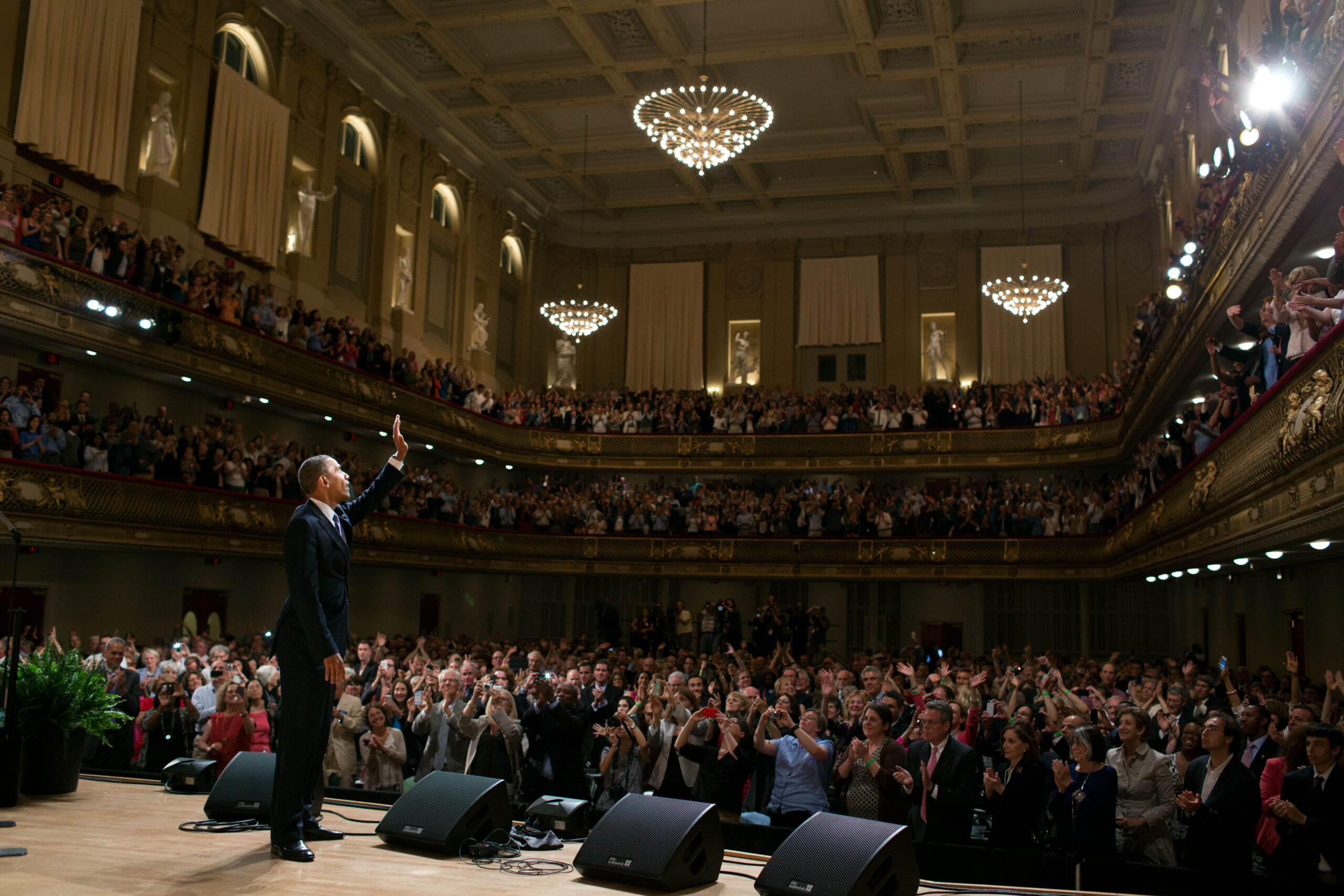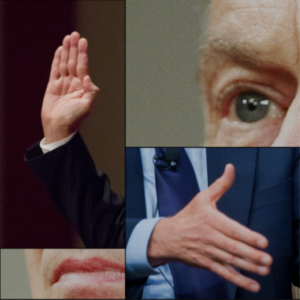Credits: The White House / Flickr
“There’s a physical feeling, a current of emotion that passes back and forth between you and the crowd, as if your lives are suddenly spliced together… a sense of connection that overrides our differences and replaces them with a giant swell of possibility.” — Barack Hussein Obama II, 44th President of the United States of America.
The first volume of Barack Obama’s political memoir of his presidency follows his previous publications The Audacity of Hope, Change We Can Believe In and Dreams From My Father. A Promised Land stands apart for its tell-all narrative of the stripped reality of the presidency from the introspection of a harsh self-critic. It also continues Obama’s trademark: transacting in the currency of idealism. Arguably the cement that ties together his beautiful written prose and oration, A Promised Land details the sheer force of an idealism responsible for propelling an ordinary American cut from Hawaiian waters to the first African-American President of the United States. In the same vein, it narrates a coming of age story of a President who was forced to accept the inevitability of his own and others’ disappointment.
The memoir is comprehensive in its scope: at 700 or so pages it covers his adolescence, studying in the concrete jungle trying to piece together his vision of the world, to his brief gig at a corporate law firm, all the way until the end of his first term as President. But the most interesting parts are buried in between the chapters that narrate his milestones. They line up his inner vulnerabilities and fears for display; a stark contrast to the composed bravado that the public only have access to. From his own admission of relentless — and even toxic — ambition and narcissism, to his inadequacies as a husband and father, and recognition of his delusions of grandeur, Obama tries hard to humanise himself. It also acts as a successful defence mechanism to pre-empt attacks or criticism as he shares in these criticisms from the outset. At the heart of his memoir, Obama invites readers to see the person behind the politics and understand the crux of his appeal: what made him electable and — later proving to be a double-edged sword — so damn likeable?
For one, Barack Obama put the work in. While he shot to national fame after his 2004 Convention speech in Springfield, Obama quickly recognised his vision and oration alone could not deliver him to the White House. He was not, in his own opinion, born to be president nor predestined for greatness. Rather, he took an opportunity at the right time he wasn’t half sure he could pull off (“But you don’t choose the time,” he quips, “the time chooses you”). In the chapters that cover his campaigns for Senate, and eventually the Democratic nomination for President, Obama’s upbringing and newcomer status meant he could not afford to be blasé with doing the legwork. Without the clout, capital and connections of the Clinton name, Obama was sure to cover all bases of American soil. As a former grassroots organiser in his hometown of Chicago, he had a sentimental attachment to the value of grassroots organisation and community fieldwork to amass a group of reliable supporters who could turn into voters. Throughout his political career, Obama expresses his affection and loyalty for this bloc of young activists who he credits his ascent to. His journey tells a story not of a man endowed with presidential qualities who rose to his natural destiny, but of a high-functioning American who did the unglamorous work of listening to his team and drudging his RV from state to state.
To Obama, elevating other people’s stories was the core of politics. “Convinced that this campaign was no longer about me and that I had become a mere conduit through which people might recognise the value of their own stories, their own worth, and share them with one another,” he remarks about the daily grind of the understated but most fulfilling aspect of politics. This was responsible for onboarding unlikely voters as in Iowa, where African Americans constituted less than 3% of the demographic, resulting in a six-point margin of victory. Equally unlikely feats were South Carolina, where deep-seated white resistance to a Black candidate polled only 10% support among white South Carolinians, but where Obama and his team clinched a two-to-one margin to Clinton. In these moments, the reader is with Obama, watching as part of the audience, hearing the deafening screams and shouts that punctuate the atmosphere that Obama captures, “right there, in the high school in the middle of the country on a cold winter night, I had witnessed the community I had so long sought, the America I imagined, made manifest.

Credits: The White House / Flickr
His unique ability to unify America along racial barriers stems, in part, from his unusual childhood. Obama did not have the typical single-parent childhood for many black Americans: “Modest without consequence to the rest of the world. But one that had given me love.” Obama’s nurturing as a black man by his white mother and middle-class grandparents in the detached, inconsequential state of Hawaii had endowed him a privilege of growing up without racial resentment. Where others found it difficult to overcome their own deep-rooted distrust of white folk and political polarisation, Obama had the audacity of hope for a unified, progressive America early on. “I understood the absurdity of my vision, how wide the gap was between my grand ambitions and anything I was actually doing in my life.” That is not to say that race relations were not a pressing issue for him, or that he never experienced racial injustice; to the contrary he readily acknowledged the rigged odds stacked against him, “I wasn’t running against Hilary Clinton or John Edwards or even the Republicans, I was running against the implacable weight of the past; the inertia, fatalism and fear it produced.” Elsewhere, he notes in metaphorical dismay: “hope and change were a luxury, folks seemed to be telling us, exotic imports that would wilt in the heat.”
In what would be a continuing theme throughout his presidency, Obama’s strategists danced on the fine line between racial loyalty and political shrewdness throughout his campaign, which more often than not meant biting his tongue: “although a part of me was frustrated with the constant need to soften for white folks’ benefit the blunt truths about race in this country, as a matter of practical politics, I knew Axe[lrod] was right.”
Predictably, there was a flipside to his early success. Whether Obama acknowledged it at the time, or only upon reflection while writing his memoir, he recognised mounting expectations, “at some basic level people were no longer seeing me… they had taken possession of my likeness and made it a vessel for a million different dreams. I knew a time would come when I would disappoint them, falling short of the image that my campaign and I had helped to construct.” Among the black community was the concept of “protective pessimism”: the syndrome of undermining Obama’s potential in order to protect themselves from disappointment of unattainable expectations. The reader cannot help but question: were unrealistic expectations projected onto Obama as a blank canvas, or did he set himself up for failure by overpromising to the American public? Did his inspiring oratory carry a grave political cost? As the memoir progresses well into his first term, and after the honeymoon period of the first 100 days, the reader senses a shift in the undertones of his earlier idealism. While Obama takes the time to champion his own achievements in office, most importantly the Affordable Care Act, his optimism eventually evolves into self-professed “naivety”, and idealism gets substituted for realism. In short, Obama quickly realises that “sometimes it didn’t matter how good your process was. Sometimes you were just screwed, and the best you could do was have a stiff drink – and light up a cigarette.”
In fairness, Obama had his fair share of these moments — both within and outside of his control. On issues of domestic policy, his administration dealt with the fallout of the financial crisis, regulating Wall Street, to environmental disasters like the Deepwater Horizon crisis, all against a backdrop of continued terrorist activity in Europe, the Arab spring and the hunt for Osama Bin Laden. When it comes to foreign policy, the most divisive topic of Obama’s presidency, he handles it tactfully. Rather than skirting around it, he takes ownership of his actions: intervening in Egypt, authorising military action in Libya and reaching a brick wall with Palestine-Israeli peace talks. He further justifies the increased presence of American forces in Afghanistan, the slow withdrawal from Iraq and the equally slow closure of military prison Gitmo.
In this way, he is careful to let the reader down slowly: easing them into the realism that eventually necessitated their fate. But most of all, he addresses the inherent contradictions of his foreign policy. Notably, the constant cherry-picking, inconsistently applied defence of human rights against Iran and China but not Israel or Saudi Arabia, and his relationships with autocrats like Hosni Mubarak. Autocrats, writes Obama, suited America because they were predictable, reliable and preserved American dominance on the world stage. So when the Arab Spring took its course, the geopolitical trade-off of conceding reliable partners in foreign regions to the idea of democracy was not a straightforward choice. “Accepting this type of realism, I told myself, was part of the job.” He too readily defaults to labelling his inconsistencies as realism in action: “I was enough of a realist to assume that had it not been for the stubborn persistence of the young people in Tahrir Square, I’d have worked with Mubarak for the rest of my presidency, despite what he stood for.” After these concessions, his persistent defence of American exceptionalism rings hollow: a once dignified record, perhaps, but now rusted, broken and awfully transparent.

Credits: The White House / Flickr
For every major domestic and foreign policy decision, Obama heavily leaned on his newly recruited Vice President — Joe Biden — to be the “last guy in the room”. Biden was an unlikely choice for VP. He did not win the spot by a mile, but narrowly snagged it from Governor Tim Kaine of Virginia (who Obama was much closer to personally). Biden was also diametrically different to Obama on paper: nineteen years his senior, he had spent thirty-five years in the Senate and had deep roots in Pennsylvania, stemming from his working-class Irish heritage. He is described as “all warmth, a man without inhibitions” contra to Obama’s calculated composure. Most importantly, he was “[a man] with heart”. He was also a practical anchor to the Obama presidency to reel in those who doubted the younger, relatively inexperienced Kaine-Obama ticket. Of course, Biden was not without his share of downsides, Obama describes, such as his lack of filter, self-awareness and inclination towards the limelight. Yet in spite of their differences in background, experience and personality, Obama’s choice of Biden as a running mate proves consequential; not just for his eight years in office but for the future presidency of 2020.
There are important omissions that undermine Obama’s memoir: authorising military action in Syria and drone strikes in Pakistan, as well as letting Israel-Palestine aggravations reach the climax of the summer in 2014. Perhaps they will be addressed at length in his second volume, or briefly touched upon as he doubles down on his achievements typical of politicians trying to defend their lasting legacy. What makes Obama’s memoir likely to be on the bestsellers lists for years to come is his intellectual, rather than personal, vulnerability. His reflections and musings on power, influence and change acquired over the years create a vessel of wisdom for all readers. Obama doesn’t have to try to be profound, he naturally and effortlessly is: “looking back, I sometimes ponder the age-old question of how much difference the particular characteristics of individual leaders make in the sweep of history — whether those of us who rise to power are mere conduits for the deep, relentless currents of the times or whether we’re at least partly the authors of what’s to come.” “I wonder whether our insecurities and our hopes,” he continues, “our childhood traumas or memories of unexpected kindness carry as much force as any technological shift or socioeconomic trend.”
Capturing the legacy of the 44th President is no easy feat. The memoir ultimately narrates a coming of age story for a politician who was forced to see America and the world for what it was. Ironically, his description of duplicitous foreign leaders damningly describes the state of power and change in his own country that he came to realise and work within: “the speeches, the small talk, the easy familiarity — it all felt too comfortable, almost ritualised, a performance that each of the four leaders had probably participated in dozens of times before… I imagined them shaking hands afterwards, like actors taking off their costumes and makeup backstage, before returning to the world that they knew…
A world without illusions — that’s what they’d call it.”


